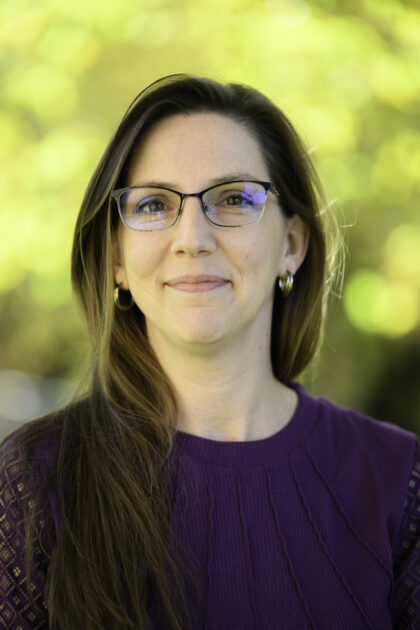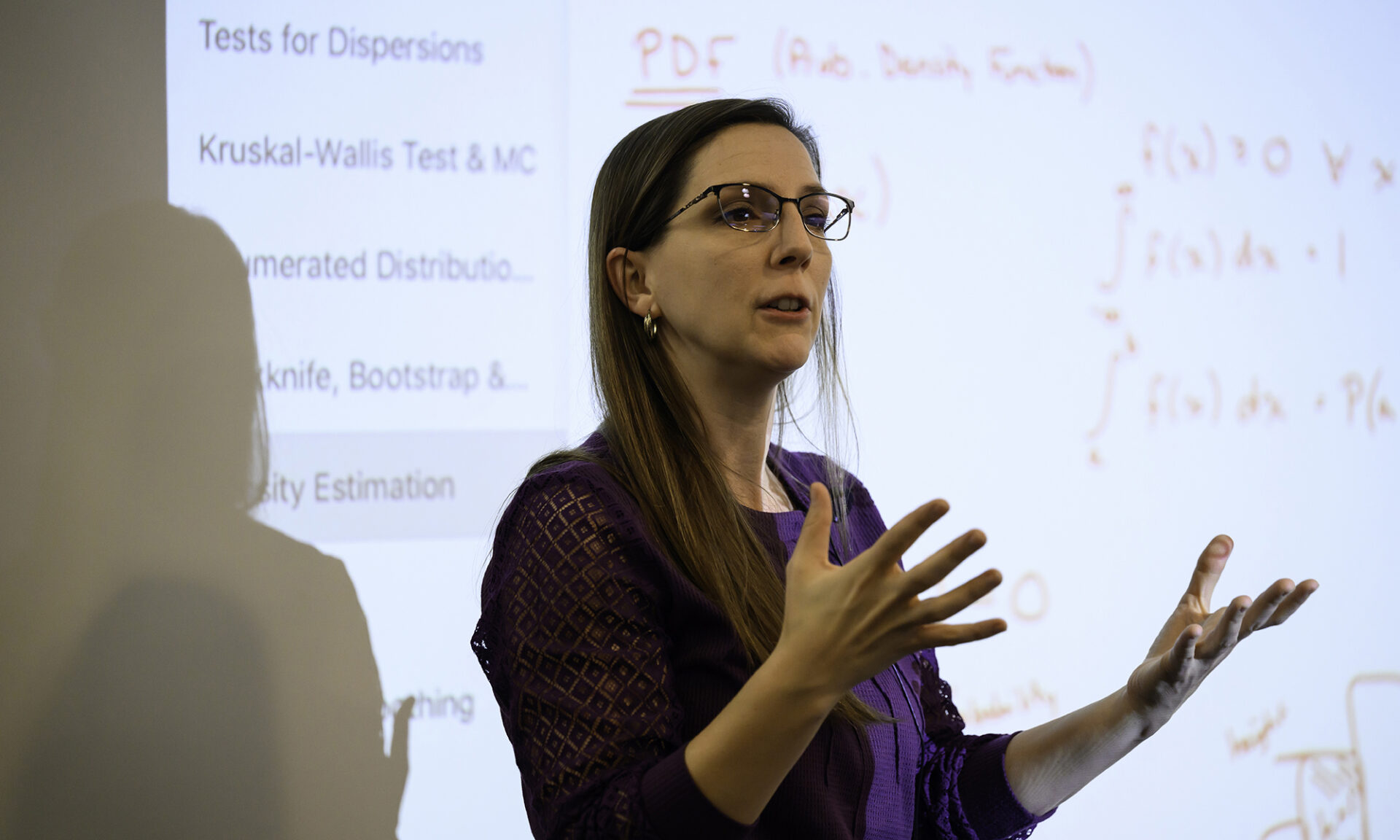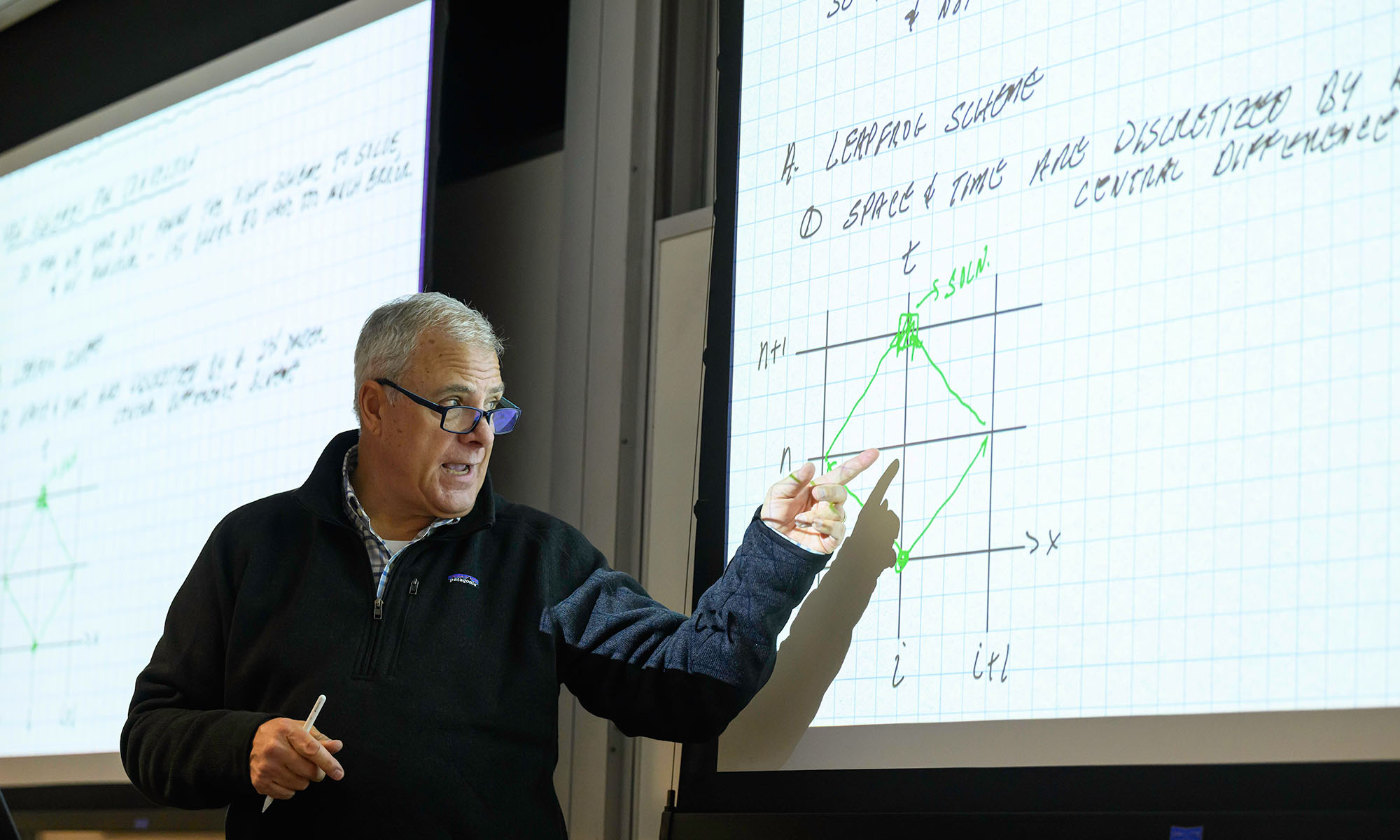The innovative statistics professor and Goergen Award winner focuses on the student experience at URochester.
Katherine Grzesik ’17 (PhD) has been a professor at the University of Rochester for seven years, but she has never forgotten what it’s like to be on the other side of the classroom.
“To be a great educator, it’s important to remain a curious student,” she says. “Teachers can forget what it’s like to see material with fresh eyes and assume students understand the material. When we fall into these traps, we risk losing our students.”
An associate professor in the Statistics Program, Grzesik (pronounced GRES-sick) is a recent recipient of the University’s Goergen Award for Excellence in Undergraduate Teaching. Students say she’s innovative and open-minded, willing to change her curriculum based on student feedback.
“I took a course with Dr. G my first year and had a great experience,” says Suchi Mehta ’25, who majored in statistics. “In my senior year, a friend took the same course, and it didn’t even sound like the same class. Dr. G is constantly implementing new ideas to improve the student experience.”
Discovering a passion for teaching
The Utica, New York, native knew little about statistics when she enrolled at the State University of New York at Oswego as a public relations and marketing major. During her sophomore year, she took an introductory statistics class and offered to tutor a classmate who was struggling with memory loss from a car accident.
“I started working with him, and he got a B in the course,” Grzesik says. “That inspired me and drew me into education.”
She switched her majors to adolescent education and mathematics and became interested in statistics after taking part in an REU (Research Experiences for Undergraduates) at Eastern Tennessee State University. “There was one problem about how often you’ll get called on if you pick a certain seat in a classroom,” she says. “It was super interesting and opened my eyes to this new world. It was math, but very relatable to the world around us. And the job prospects were excellent.”
She enrolled in graduate school at URochester in 2011 and earned her doctorate six years later.
Innovative ways of teaching statistics

Statistics is a notoriously challenging subject, and Grzesik knows she’s teaching students who may be taking a required course as well as those who want to make it their career, so she adjusts accordingly.
“My introductory classes are more lecture-based,” she says, “while the upper-level classes are more interactive.”
Grzesik frequently works with staff at the University’s Teaching Center to consider both minor and substantial course updates. She is always looking for innovative ways to improve her classes.
In one class, students take an exam on their own, then again two days later in groups of three. The first test counts for 75 percent of the grade.
“Students spend two days thinking about whether they felt they understood the question without knowing if it was right or wrong,” Grzesik explains. “Then, they meet in small groups and discuss their answers. If they struggled, they get to hear an explanation from peers who perhaps understood it well. They get another chance at learning that concept.”
She records her lectures but has limited their availability to one week for introductory courses after discovering that making them available all semester led to many students “binging” the recordings the day homework was due—and often missing class that day.
“Learning is a workout for the brain,” she says. “You can’t just do heavy lifting one day only and expect to make long-term gains.”
This “workout routine” is a mindset she encourages her students to bring to learning.
“Lift (learning something) on Mondays and Wednesdays, stretch (practice) on Tuesdays and Thursdays to prevent soreness, and challenge yourself (office hours) on Fridays,” she says. “Then use those well-trained brain muscles to perform the homework.”
Keeping a ‘student mindset’
Joseph Ciminelli, an associate professor of statistics and director of the statistics program, says no two semesters with Grzesik are ever the same.
“She’s always thinking about how she can refine her pedagogical initiatives and provide the best educational experience possible,” he says. “Each semester, she thinks about what is working well and what can be improved, adapting to the unique setting of that particular group of students.”
When Grzesik joined the URochester faculty in 2017, 18 students majored in statistics. In the eight years since, Ciminelli says that number has grown to 45. Nine new courses have been introduced, with Grzesik taking the lead on four. In addition to developing upper-level statistics courses, she has refined established ones.
“It keeps me in the student mindset,” she says.
Ciminelli says Grzesik is a wonderful researcher who could have taken her career in a more research-focused direction. Instead, he says, “she pursued her passion for teaching, and the University and our students are all the better because of it.”
What URochester students say about Katherine Grzesik
“I’ve never met a professor who does as much experimentation with her courses and really takes time and considers feedback to assess those innovations and works on making the course even better the next time. Dr. G is constantly implementing new ideas. While the content of introductory statistics is essentially the same, her course design keeps adapting to improve.”
—Suchi Mehta ’25, statistics major“It only took a few lectures for me to fall completely in love with Dr. G’s style of teaching and see the passion with which she lectured. I never thought I’d be able to comprehend statistics in the way I did, let alone TA for the coding lab, but she provided every resource necessary for anyone to be able to learn. Working under Dr. G has been one of the best experiences of my college career, and her unwavering love for statistics has never failed to impress me.”
—Atreyee Ghosh ’25, biochemistry major“I took Dr. G’s introduction to statistics class and have worked with her for four semesters as a teaching assistant. I’ve seen the countless hours she has dedicated to ensuring that students understand not only the content but also that the students who take her course always succeed. No question was considered ‘silly’ or met with judgment. I’ve noticed her passion, not only in sharing her knowledge of statistics but in the love she has for this subject.”
—Poushali Ray ’25, psychology major





